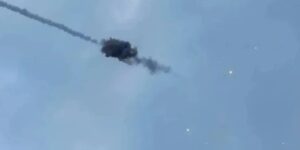
The ongoing conflict between Russia and Ukraine has reached a new level of intensity, with reports emerging of heightened military activity and explosions near Ukraine’s border with Moldova. As tensions continue to simmer, Poland has taken decisive action by scrambling fighter jets, underscoring the gravity of the situation and raising concerns about the potential for further escalation.
The latest developments come amidst a flurry of diplomatic efforts to defuse the crisis, with world leaders expressing growing alarm over the deteriorating situation in Eastern Europe. The explosions near Ukraine’s border with Moldova have added to the sense of urgency, prompting fears of a wider conflict that could destabilize the region.
Poland’s decision to scramble fighter jets highlights the serious nature of the security threat posed by the escalating crisis. With the situation on the ground rapidly evolving, neighboring countries are taking proactive measures to protect their borders and ensure the safety of their citizens.
Meanwhile, reports of explosions near Ukraine’s border with Moldova have sparked widespread concern and speculation about the source and intent of the blasts. While the exact circumstances surrounding the explosions remain unclear, they serve as a stark reminder of the volatility and unpredictability of the situation in Eastern Europe.
The international community has condemned the escalating violence and called for an immediate cessation of hostilities to prevent further bloodshed and suffering. Diplomatic channels remain open, with world leaders urging all parties to exercise restraint and engage in meaningful dialogue to resolve the crisis peacefully.
However, the path to de-escalation remains fraught with challenges, as deep-seated grievances and geopolitical tensions continue to fuel the conflict. The stakes are high, with the potential for a wider regional conflagration that could have far-reaching consequences for global security and stability.
Against this backdrop, efforts to find a peaceful solution to the crisis must be redoubled, with a renewed focus on diplomacy, dialogue, and compromise. The international community must work together to address the root causes of the conflict and support efforts to achieve a sustainable and lasting peace in Eastern Europe.
As the situation continues to unfold, the eyes of the world remain fixed on the region, with hopes for a swift resolution to the crisis and an end to the suffering of the people caught in the crossfire. The coming days and weeks will be critical in determining the course of events and shaping the future of Eastern Europe.




